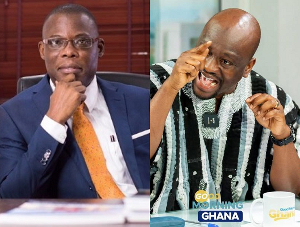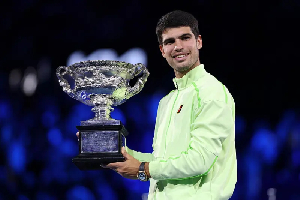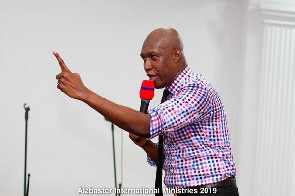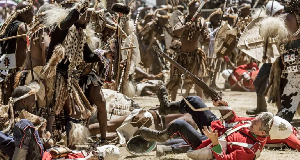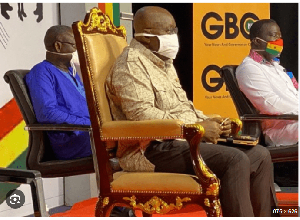Opinions of Monday, 28 July 2008
Columnist: Konongo Fordjour
Democratic Ghana in Authoritative Africa
- Part 2 [Diplomacy and Governance]
Written by Konongo Fordjour - 07.24.08
The aftermath of the rough tides that swept through the African political landscape demands that we get back to business. However, we still need to do assessment on “what went wrong and what went rightâ€. Political stock-taking is necessary but that is one single thing very uncommon in our African context. So many issues have been swept under the carpet without seriously revisiting them; hence these problems resurface to find us unprepared. For instance, having experienced numerous ethnic wars from Congo-Zaire through Angola, Uganda, Somalia, Liberia, Ivory Coast, Sierra-Leone, and Nigeria to barbaric killings in Rwanda, Kenya, Togo, Zimbabwe, and currently in Sudan’s Darfur, Africa must be coming up with a strong laid down principles to fight the evil within us. Instead, we seem helpless even in the face of inevitable carnage in the horizon from Namibia, Guinea-Conakry, and South Africa, of all countries.
One most promising thing that I pride myself with is President Nkrumah’s African High Command project supposed to act as a force to liberate the continent in times of crises like these. But it looks like that important arm of continental function, although has been applied, it’s not performing well. What then are the possible strategies to develop to boost its functionality? Finance is the most important aspect to attack if we want to sound serious. Commitment of our current leaders towards the security of the continent is also another line of consideration. Since money goes with commitment, our previous experience of individual states shouldering the problem and brought fruitless results discourages further motivation from others. Therefore, we shouldn’t consider another volunteer state to do that for us anymore. What must we do then?
It is now the turn of our retired statesmen. It was all right to argue that our forefathers, who fought so hard to liberate Africa, did not have the skilled personnel to help fight the colonialists. But more than fifty years down the road with a huge stock of statesmen, we could be doing better than our present mediocre performance. At least we have our brilliant, highly educated, and extremely skilled personalities such as Busumuru Kofi Annan, Dr. Boutros Boutros Ghali, Dr. Salim Ahmed Salim, Dr. Edem Kodjo, Dr. Mo Ibrahim, and President Joachim Chisano. I have been too careful not to over-crowd my list with the in-exhaustive former presidents in order not to be biased or to increase emotions. However, Former President Chisano has been universally declared the best former president in the history of Africa and first ever Mo Ibrahim’s award recipient. Therefore, it suffices to include him in the list of my Eminent Personalities for African Advancement (EPAD).
Personalities during President Nkrumah’s time were engaged in the political liberation of Africa. But Nkrumah’s “total†liberation concept was two-fold: political liberation, and economic liberation. The first part has been satisfied, although not fully. Today, all African countries have been liberated politically, but the economic aspect exposes us to yet another form of modern day colonialism. The causes of our inadequacies in the political liberation of Africa are many but they combine to form a single factor which is self-destructive in our quest for continental governance. That is, our individual statutory legislative structures on the continent are faulty. The question is: do we need to proceed with the current practices and/or structures of our inherited European style of governance? Yes and No. Part of me agrees with the question because there must be continuity of civil liberties since that is what we are accustomed to. The evils of partitioning forced their culture, lifestyle, administration and governance on us through coercive method without having the freedom to choose for ourselves the preferred line of human development. After securing our independence by wrestling power from the Europeans and in most cases, sending them back to their own countries, we should be coming up with our own kind of governance.
Our inability to do this is blamed on ourselves. Most of our academic and professional entities are psychotic patients with educational malnutrition that affect continental advancement. And unfortunately such caricatures find their way into the state parliaments across the continent. Hence, either they retard progressive debate, or are simply non-productive in parliamentary discussions. For instance, Africa wastes too much funds in internal issues than she could have spent on things that are worth the expenditure. In Ghana, for instance, money spent on the overseas health treatment of parliamentarians and executives during their four-year-term in office can be used to build hospitals of the same standard they visit in overseas and still take care of hiring and maintenance of that quadrant in our healthcare delivery. Our MPs don't seem to know this. With reference to Ghana again, Asamoah-Gyan, Ghana's soccer player in the 2008 African Cup of Nations in Ghana, who suffered head injuries during the tournament required expert medical tests. The whole country could not find any equipment in Ghana to detect his ailment except some 800 miles in far way Nigeria and the country sees nothing wrong with that. Yet a whole national parliament sees wearing $1.5 million worth of gold necklaces very impressive on their resume. Are we satisfied with our European type of education and our special kind of mindset? Well if wearing human gold chains in the offices looks all right, then what is wrong with selling silver dog chains in the streets?
Part of me is also saying no because most important discussions starring at the African MPs as to what way forward to wean ourselves from European-style governance have been sacrificed for their self-aggrandizement, dancing to the amusement of their European masters’ “exotic musicâ€, and their personal gratification. A case in point is the disgraced Ghanaian MP, Eric Amoateng, serving a ten-year term in jail in New York, USA, for selling cocaine there. We remain in our separate statutory governance, maintenance of our individual police and military systems, and separate “sovereignty†that help the old colonial enemies to manipulate the continent the way they deem fit. Our numerous statutory constitutions have helped create tribal-based military and police structures that serve individual persons in leadership to terrorize their own people. We need to move away from inaction. Hopefully, the current developments in Ghana's parliamentary electoral changes ahead of 2009 composition, for instance, will show a positive direction for the entire continent to tread. Critical analysis shows that the ruling NPP party of Ghana has replaced about 95% of its poorly-performing MPs through its local primaries.
The second line of liberation, economic, which is the basis of this discussion, requires a careful nurture and continuous monitor. I propose that the six personalities mentioned above must form the EPAD. Besides the Mo Ibrahim award, they should work as an independent body different from the African Union’s (AU) secretariat to communicate directly with the various state governments in an advisory level to encourage them against dictatorial and hardliner stance. They should also advise states on “rule of law†issues, use many other methods to reward independent resignation from leadership, periodic voting, defuse irate opposition campaign of retribution on ruling parties and constitutional restructuring to feature strictly defined term of office of the presidency. I will also suggest that the states should make a package for the retiring heads of state so that he/she will not go home empty handed. It will help good governance, dedication, and provision of selfless services to mother Africa.
Negotiations, the main deficiency in our African governance, must be developed. Human nature is such that there will always be conflicts, regardless. When we do, there must always be solutions. The quality of conflict resolution is relative to the quality of the team of personalities assigned to handle the problem. We need a team of respected and well dedicated personalities similar to the one that negotiated in the recent Kenyan crisis. Africa must learn to solve her own problems. It is quite disappointing to see all our able men and women hang around and still turn to long noses to meddle in our internal problems; we have flat noses, please! “If we do not know how death looks like, we must watch someone-else sleepingâ€. Look at their invitations to our African leaders they are comfortable with, to attend their so-called G-8 Conferences. They will listen to our leaders but they will not do what they suggest to them. They have their own agenda that do not feature Africa, and we should not expect anything good from them, plain and simple.
There is even a talk about the “black African and American†Barrack Obama presidency that will “change†things around, do you believe that? To begin with, the guy does not even have any black in his advisory and campaign committees; neither does he represent the voice of the larger black community. Barrack Obama will be a living testimony, if he wins, to castigate black folks for good as lazy, too noisy, unimpressive, and not worth the time to be taken seriously. Right now some black folks are reconsidering their decisions regarding the forthcoming crucial elections. Some have even started sinister campaigns that a true black leader is yet to be born, not an “imported spermâ€. Could the white folks be presenting a black leader to the world who himself is not a true black representative? Can we take the west any serious?
My plea is that we need a permanent EPAD that will transform Africa through transfer of wisdom and training to generations to come. We have to use our own human resources and material wealth to cause quality human welfare. Africa is second to Asia, by population, and can generate huge trade relations among ourselves. Only if we can leave the western defined “despots†alone and concentrate on productive leaders to move ahead. We need to design light manufacturing industries regardless of their quality - we will improve over time - to supply ourselves. This will alleviate pressure on us in times of sanctions to deliberately starve and destroy our economies, in the name of political order, the western style.
I am highly optimistic that if we are able to present the personalities proposed in the EPAD, the leaders on the continent will begin to respond favourably and sanity will prevail and our match to a united African federation will be a reality. We simply cannot separate politic from economics. A synergistic amplitudinal direction for any aesthetic appreciation of our continent will require quality leadership example. Can someone out there help me by bringing my article before these eminent personalities to consider as urgent issue of continental importance and assist as proposed?
In conclusion, Africa cannot move on in development until we initiate a genuine leadership trend that will spearhead a continental lineage. Our current individual separatist statutory governance is not good enough. It’s time to begin cleaning some borders and probably re-demarcate for peace and development. We need to govern Africa diplomatically especially in such a multi-lingua continent of ours. Antagonism has proven unworkable, and western democratic imitations have also been modeled to resemble the longevity rule of our known traditional chieftaincy rules. Where do we go from here? Ghana still has a role to play here again. Busumuru Annan must initiate this. You are our last result, sir.
Konongo Fordjour
Global Analytica, Boston-USA
E-Mail: koafordjour@yahoo.com


